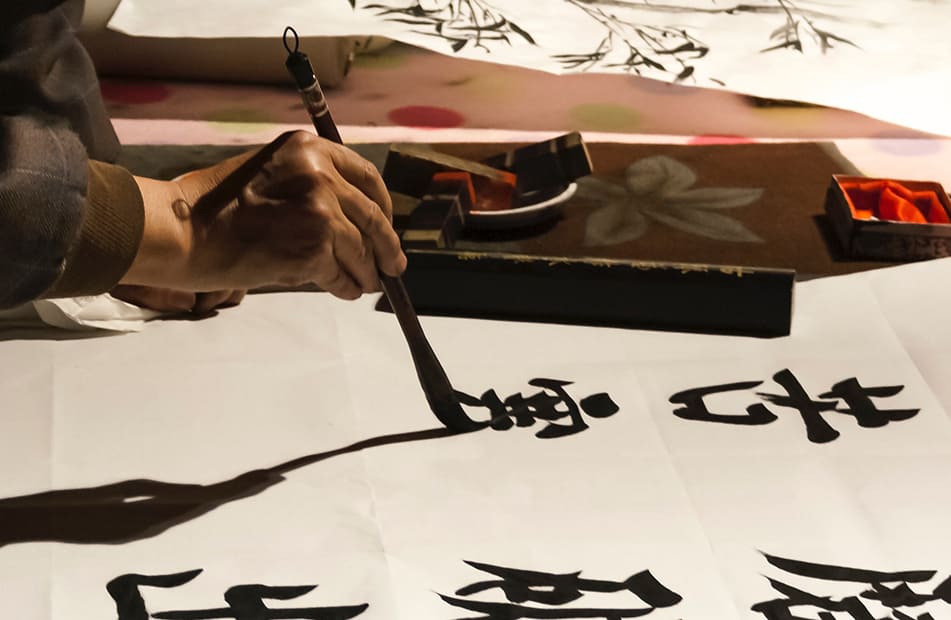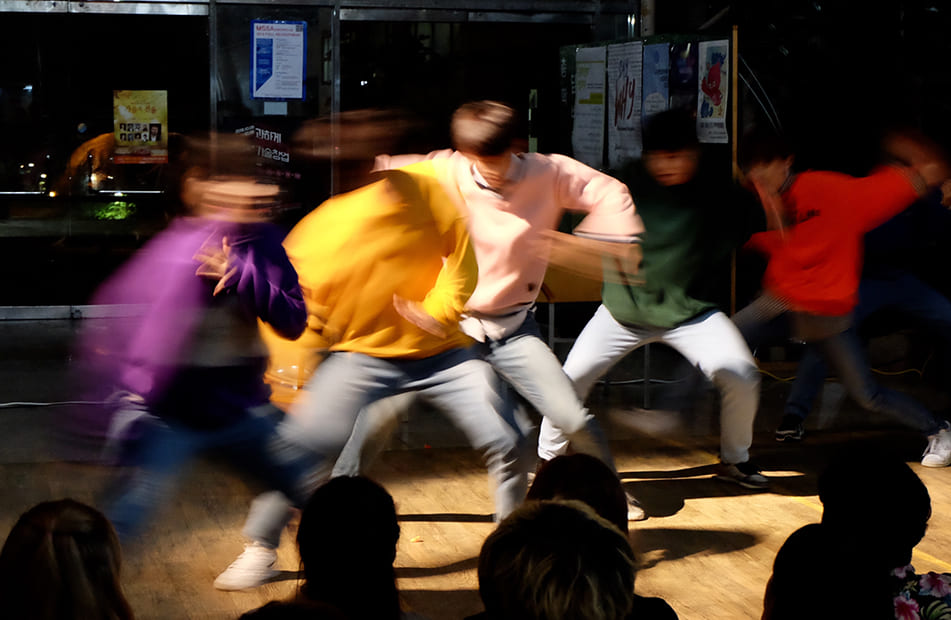Outline of the course
This course is for beginners learning Korean for the first time in their life. The students learn phonics, the character system of the Korean language and basic conversational skills to survive in Korea. By learning basic grammar, vocabulary, conversation, reading, listening and writing as well as Korean culture in a categorized and integrated methodology using various teaching materials, the students effectively obtain the minimum communication skills necessary to survive in Korean society through step-by-step practice that can then develop in the socio-cultural dimension.
Objective of the course
The objective of this course is to provide beginner level learners with a minimum linguistic ability to survive in Korean society by studying sounds, the alphabet, basic grammar and vocabulary. After the course, the students should be able to speak simple Korean; give a self-introduction, ask for directions and information on locations, go shopping,tell the time, issue greetings, make congratulatory remarks and involve themselves in simple Q&As about daily life. By obtaining the cultural knowledge, customs and manners inherent to the language, on top of fluency and accuracy in using the language, the students build the ability to use Korean with enough ease and comfort that they should not feel the psychological burden of embarrassment that an adult learner could otherwise feel.
Introduction of syllabus and time schedule
-
1
WEEK 1
좌우로 스크롤 하시면 확인이 가능합니다.
Day Unit Grammar Point · Expression Subject · Task 1 Korean Phonics and alphabet 1 2 Korean Phonics and alphabet 2 3 Korean Phonics and alphabet 3 4 Korean Phonics and alphabet 4 5 Preparation 1 Expressions related to names of people, names of countries,
occupations and greetingsSelf-introduction, greeting,
asking questions -
2
WEEK 2
좌우로 스크롤 하시면 확인이 가능합니다.
Day Unit Grammar Point · Expression Subject · Task 6 Preparation 2 "How do you say it in Korean?" Name of object,
possession & compliment7 Preparation 3 Numbers in pure Korean, measurement nouns
& "How many are there?"Ordering & purchasing an item 8 Preparation 4 Subject particle, sentence structure, place nouns How to get there? 9 Chapter 1 Numbers originating from Chinese, expressions related to
telephone numbers, prices of object & datesAsking about the price of objects and telephone conversations,
finding out information about friends10 -
3
WEEK 3
좌우로 스크롤 하시면 확인이 가능합니다.
Day Unit Grammar Point · Expression Subject · Task 11 Chapter 2 Expression of time (numbers in Chinese, numbers in pure Korean,
hours and minutes), verb usage 1, "Where are you going?
What are you doing?"Asking times, finding out time
schedules, simple conversations with people on street12 13 Review and quiz for Chapters 1 & 2 14 Chapter 3 Usage of particles 'eul/leul', verb conjugation 2,
“What day is it today?”Investigating preferences,
holidays, favorite places15 -
4
WEEK 4
좌우로 스크롤 하시면 확인이 가능합니다.
Day Unit Grammar Point · Expression Subject · Task 16 Chapter 4 Past tense (-utsseoyo), negative sentences (an-), time expressions (year, month, week and day), "When / why / what did you do?" Talking about yesterday,
last week, last holiday,
personal experiences17 18 Review and quiz for Chapters 3 & 4 19 Chapter 5 Expressions of intention (-ruh gada), nouns for location
(above / below / front / back / left / right)Looking for lost items and finding directions 20 -
5
WEEK 5
좌우로 스크롤 하시면 확인이 가능합니다.
Day Unit Grammar Point · Expression Subject · Task 21 Chapter 6 Instructions and prohibitions (-seyo, -ji maseyo), hopeful expression (-go shipda), means of transportation, "How do you get there?" How to get to tourist destinations in Seoul,
how to ask locations, culture, ordering game22 23 Term end written examination
강의 개요
본 강의는 몰입 한국어 중급 3을 이수하였거나 이에 준하는 한국어 실력을 갖춘 학습자를 대상으로 한다. 학습자는 다양한 맥락 전반에 걸쳐 의사소통에 관여하는 변인들을 이해하고 한국 문화에 대한 지식을 바탕으로 전문적인 담화를 구성할 수 있다. 개인적 환경뿐 아니라 업무적, 공적 환경에서 공식적, 비공식적 의사소통을 정확히 인식하고 의사소통 전략을 효과적으로 사용할 수 있다. 개인적 환경뿐 아니라 공적 환경에서의 공식적, 비공식적 의사소통을 정확히 인식하고, 의사소통 전략을 효과적으로 사용할 수 있다. 대화 참여자의 문화, 개인적 차이, 소속 집단의 특성 등을 포함하는 배경 지식을 이용하여 설득, 격려, 주장, 추론, 문제해결을 할 수 있다.
강의 목표
본 강의의 목표는 학습자가 한국의 사회, 문화 모습과 그 배경을 이해하여 문화적인 지식을 바탕으로 고급 담화를 구성하도록 하는 것이다. 한국 현대사를 담은 영화를 통해 정치, 역사와 같은 전문적인 주제로 개인의 사고와 의견을 반영하여 표현할 수 있도록 의사소통 능력을 향상시키는데 있다. 또한 한국 예술(음악, 미술, 춤)에 대한 정보를 공유하여 한국 문화 지식을 넓히고 한국인의 고유 특성을 이해할 수 있다. 사자성어 및 속담, 관용표현을 통해 풍부한 표현 능력을 향상시키고 논리적인 담화 구성 능력 향상을 위한 고차원적인 언어 구사 전략을 익힌다.
강의 소개 및 일정
-
1
WEEK 1
좌우로 스크롤 하시면 확인이 가능합니다.
Day Unit 학습 목표 1 - Orientation & Placement Test 2 1 - 인물 읽기 : 인생의 전환점을 맞은 사회 명사들에 대한 글을 읽고 그 내용을 토의한다.
- 어휘 표현 : 다양한 감정 어휘를 학습하여 감정 묘사를 세련되게 한다.
- 말하기 과제 : 마인드맵을 이용해서 주요 사건 이야기하기
- 쓰기 : 긍정적, 부정적 감정 어휘 표현을 이용해 중요한 사건 기술하기
- 미디어 : 미디어 클립 감상 및 관련 문화 학습
3 - - 읽기 : 안철수 씨에 대한 인터뷰 기사문을 읽고 그 내용을 이해한 후, 인터뷰를 하는 방식에 대하여 익힌다.
- 어휘 표현 : 호응 관계의 부사어를 이용한 문장 표현을 익힌다.
- 말하기 : 자신의 인생에서 중요한 사건을 감정 어휘를 사용하여 적절하게 발표할 수 있다.
- 쓰기 : 한 사람을 정하여 인터뷰한 후 기사문 작성하기
- 미디어 : 영상 자료 학습 관련 어휘 표현 연습 및 과제 수행
4 2 - 서울의 명소 읽기 : 관광 안내지를 읽고 정보를 찾아 다른 사람에게 추천할 수 있다.
- 어휘 표현 : 관광 안내를 위한 유명 장소 관련 어휘를 학습한다.
- 말하기 : 정보를 격식적이고 효과적으로 전달할 수 있는 표현을 배우고 연습한다.
- 쓰기 : 비교하기, 대조하기, 공통점 밝히기 등 다양한 표현을 사용하여 관광 안내지 쓰기
- 미디어 : 미디어 클립 감상 및 관련 문화 학습
5 - - 읽기 : 학생의 발표문을 읽고 발표문을 쓰는 방법, 발표하는 방법, 자료 조사 방법, 컴퓨터로 자료를 준비하는 방법 등에 대하여 배운다.
- 어휘 표현 :발표문에 자주 쓰이는 구문과 표현들을 익힌다.
- 말하기 : 조사하고 싶은 한국의 명소를 정하고, 자료 조사 방법과 발표 등을 학생들끼리 의논한 후 정리하여 발표할 수 있다.
- 쓰기 : 자신이 가본 곳을 소개하는 글 쓰기
- 미디어 : 영상 자료 학습 관련 어휘 표현 연습 및 과제 수행
-
2
WEEK 2
좌우로 스크롤 하시면 확인이 가능합니다.
Day Unit 학습 목표 6 - Review & Quiz 7 3 - 풍습 읽기 : 인터넷에서 출생과 장례에 대한 간략한 글을 읽고 정보를 찾아 전달할 수 있다.
- 어휘 표현 : 사동사를 학습하여 사동문 형식을 익힌다.
- 말하기 : 사동의 개념을 익히고, 가장 빈번하게 사용하는 사동사를 익혀 자연스럽게 사용할 수 있도록 연습한다.
- 쓰기 : 사동 표현 연습
- 미디어 : 미디어 클립 감상 및 관련 문화 학습
8 - - 읽기 : 일기문을 읽고, 사건의 순서와 글쓴이의 감정을 추측할 수 있다.
- 어휘 표현 : 결혼 절차와 관련된 어휘를 학습 활용한다.
- 말하기 : 한국의 풍습과 학생 자국의 풍습을 비교하여 설명할 수 있다.
- 쓰기 : 풍습을 비교하는 간단한 보고서 쓰기
- 미디어 : 드라마 관련 어휘 표현 연습 및 과제 수행
9 4 - 사자성어와 속담 읽기 : 사자성어를 설명한 학습 만화를 읽고, 사자성어의 유래와 의미에 대하여 이해할 수 있다.
- 어휘 표현 : 사자성어, 속담에 나타난 어휘를 학습한다.
- 말하기 : 속담이나 사자성어 등 옛말을 인용하는 방법을 연습한다.
- 쓰기 : 속담, 사자성어 연습
- 미디어 : 미디어 클립 감상 및 관련 문화 학습
10 - - 읽기 : 사자성어를 설명한 사전을 각자 나누어 읽고 사자성어의 의미와 자연스럽게 사용할 수 있는 방법에 대하여 설명할 수 있다.
- 어휘 표현 : 사자성어에 나타난 한자어를 익힌다.
- 말하기 : 사자성어를 사용하여 자연스러운 대화를 만들고 발표할 수 있다.
- 쓰기 : 사자성어 사전 만들기, 유래 찾아서 정리하기
- 미디어 : 드라마 관련 어휘 표현 연습 및 과제 수행
-
3
WEEK 3
좌우로 스크롤 하시면 확인이 가능합니다.
Day Unit 학습 목표 11 - Review & Quiz 12 - Mid-term Review 13 5 - 문학 읽기 : 한국 현대시를 한 편 읽고 단어의 의미와 시 전체의 의미를 음미하면서 시를 낭송할 수 있다.
- 어휘 표현 : 시에 표현된 비유적 어휘들을 학습한다.
- 말하기 : 문학 작품에서 자주 등장하는 비유 표현을 익히고, 이를 사용하여 대화를 구성하는 방법을 연습한다.
- 쓰기 : 개작 시 쓰기
- 미디어 : 미디어 클립 감상 및 관련 문화 학습
14 - - 읽기 : 한국의 유명한 수필을 한 편 읽고, 문학적 표현을 이해하고 이를 통해 한국의 문학적인 감수성에 대하여 이해할 수 있다.
- 어휘 표현 : 관용적 비유 표현을 알아보고 사용한다.
- 말하기 : 자신이 좋아하는 것을 비유 표현을 사용하여 문학적으로 표현한 후 이를 발표할 수 있다.
- 쓰기 : 나의 사랑하는 생활에 대한 수필 쓰기
- 미디어 : 영상 자료 관련 어휘 표현 연습 및 과제 수행
15 6 - 한국인의 대화법 읽기 : 좋은 인간관계를 위한 대화법에 대한 신문 칼럼을 읽고, 좋은 대화법이란 어떤 것인지에 대하여 이해하고 의견을 나눈다.
- 어휘 표현 : 칭찬에 대답하기, 맞장구치기, 화제 전환하기와 관련된 어구들을 배우고 활용한다.
- 말하기 : 한국인의 대화법에서 특징적으로 나타나는 맞장구 표현, 칭찬 표현 등을 배우고, 적절한 행동과 함께 연습한다.
- 쓰기 : 한국인의 대화법 연습
- 미디어 : 미디어 클립 감상 및 관련 문화 학습
-
4
WEEK 4
좌우로 스크롤 하시면 확인이 가능합니다.
Day Unit 학습 목표 16 - - 읽기 : 자신의 대화 방법에 대한 고민 상담글을 읽고 이해한 후, 인상적인 내용을 찾아 자신의 의견을 밝힐 수 있다.
- 어휘 표현 : 상담내용에 나타난 불만과 조언에 필요한 어휘 및 표현을 학습한다. 말하기 : 효과적인 한국인의 대화법을 적용하여 역할극을 하고, 교사의 수정 사항에 따라 표현이나 행동을 적절하게 고칠 수 있다.
- 쓰기 : 자신의 대화법을 고찰하는 글 쓰기
- 미디어 : 영상 자료 관련 어휘 표현 연습 및 과제 수행
17 - Review & Quiz 18 7 - 성공적인 삶 읽기 : 성공적인 삶의 습관에 대한 책의 목차를 읽고, 목차의 특징을 이해하며, 목차에 따른 글의 내용을 추정할 수 있다.
- 어휘 표현 : 텍스트에 나타난 어휘를 학습한다.
- 말하기 : 자신의 의견을 효과적으로 주장할 수 있는 방법에 대하여 익힌다.
- 쓰기 : 다양한 표현을 사용하여 주장하는 글 쓰기
- 미디어 : 미디어 클립 감상 및 관련 문화 학습
19 - - 읽기 : 주장하는 글을 읽고, 요약한 후 효과적으로 주장하려면 어떤 문단 전개 방식이 사용되는지에 대하여 파악할 수 있다.
- 어휘 표현 : 주장에 필요한 어구를 학습하여 표현한다.
- 말하기 : 자신의 주장에 대한 연설문을 작성하고 효과적으로 발표할 수 있다.
- 쓰기 : 자신의 주장을 정리하여 완결된 연설문으로 작성하기
- 미디어 : 영상 자료 관련 어휘 표현 연습 및 과제 수행
20 8 - 한국 현대사 읽기 : 6 25 전쟁과 박정희 대통령에 대한 연보와 짧은 설명문을 읽고 한국의 현대사에 대하여 이해할 수 있다.
- 어휘 표현 : 현대사와 관련된 어휘를 학습한다.
- 말하기 : 역사적 사건을 설명할 때 사용할 수 있는 여러 표현에 대하여 배우고 연습한다.
- 쓰기 : 시간, 수, 인과 관계를 밝히는 표현 등 연습
- 미디어 : 미디어 클립 감상 및 관련 문화 학습
-
5
WEEK 5
좌우로 스크롤 하시면 확인이 가능합니다.
Day Unit 학습 목표 21 - - 읽기 : 이산가족 문제에 대한 사설을 읽고 글쓴이의 의도를 파악하고 요약할 수 있다
- 어휘 표현 : 이산가족 문제에 대한 사설 속 어휘와 표현을 살핀다.
- 말하기 : 자국의 역사적 사건에 대하여 적절한 표현을 사용하여 설명할 수 있다.
- 쓰기 : 역사적 사건에 대하여 정리하는 글 쓰기
- 미디어 : 영상 자료 관련 어휘 표현 연습 및 과제 수행
22 - Review & Quiz 23 - Final Review, Written and Interview Test
교재 및 부교재
| 주교재 |
|
|---|---|
| 부교재 |
|
| CD-Rom | 적절한 발화 속도와 표준어에 맞게 인터뷰 기사, 발표문, 수필 등을 읽은 자료가 수록되어 있으며, 외국인 학습자가 이를 듣고 이해할 수 있도록 제작되었다. |
| 유인물 | 문법 및 활동 연습지, 사진 자료, 슬라이드, 동영상 자료 등 |
| 멀티미디어 | 드라마 ‘새는’ 편집용 CD와 DVD |
평가
- 1 출석 및 참여도 (10%) 출석과 적극적인 참여가 필수적이기에 100% 출석하고 협력 학습을 주도적으로 수행한 학습자는 10점을 받는다. 수업 시간에 껌 씹기, 과자 먹기, 책상에 엎드려 있기, 친구의 실수 비웃기, 잡담하기 등의 부적절한 태도를 보인 학생은 감점을 받는다. 세 번 지각한 경우 한 번의 결석으로 간주한다.
- 2 숙제 (10%)
- 3 퀴즈 (30%) 학습자는 퀴즈를 통해 학업 성취도 정도를 점검하고 자신에게 부족한 점이 무엇인지 인지하여 학습 계획을 수정한다. 4회 실시한다.
-
4
기말 필기 시험 (25%)
- 쓰기 : 단답형/ 단문 쓰기/ 주어진 주제로 장문쓰기
- 문법·어휘 어휘 객관식/ 단답형의 주관식/ 담화 완성하기
- 읽기 주어진 글을 읽고 이해도를 측정하는 객관식과 주관식 문제
- 5 기말 구술 시험 (25%) 인터뷰 또는 역할극 방식으로 진행한다.
-
6
최종성적
최종 성적은 위의 항목 등을 합산하여 절대 평가로 다음과 같이 주어집니다.
학점 점수 학점 점수 학점 점수 A+ 98 ~ 100 B+ 88 ~ 89.9 C+ 78 ~ 79.9 A 94 ~ 97.9 B 84 ~ 87.9 C 74 ~ 77.9 A- 90 ~ 93.9 B- 80 ~ 83.9 C- 70 ~ 73.9 - 80%이상의 출석률과 C학점 이상이 동시에 충족되면 다음 단계를 수강할 수 있는 자격이 주어진다. 둘 중 하나를 충족시키지 못 한 경우 다음 단계를 수강 할 수 없다.
교칙
- 학습자는 교실 내 문화적, 언어적 다양성을 이해하고 다른 학습자의 문화적 언어적 배경을 항상 열린 마음으로 존중해야 한다.
- 수업을 방해하는 행동(예, 음식물 섭취, 잡담, 핸드폰 사용, 활동 거부, 지나친 모국어 사용 등)은 퇴학의 사유가 된다.
Sample Activities Calendar
좌우로 스크롤 하시면 확인이 가능합니다.
| SUN | MON | TUE | WED | THU | FRI | SAT |
|---|---|---|---|---|---|---|
| Dormitory Check-in |
Placement Test | Orientation & Meeting with Language Buddy | K-style Club | Cooking Class |
2-day Field Trip (Extra Fee) |
|
| - | Martial Art TAEKWONDO | Mask Dance TALCHUM | Caligraphy | Survival Quiz Show | Cheering At Baseball Game | - |
| - | Koglish Quiz | War Memorial Museum | SEJONG Story | Traditional Games | Nonverval Performance NANTA | SEOUL Hiking |
| - | Learning K-pop Dance | SAMULNORI | Temple Experience | Final Presentation | Completion Ceremony | Dormitory Check-out |
Sample Activities Calendar
좌우로 스크롤 하시면 확인이 가능합니다.
| SUN | MON | TUE | WED | THU | FRI | SAT |
|---|---|---|---|---|---|---|
| Dormitory Check-in |
Placement Test | Orientation & Meeting with Language Buddy | SEOUL Fortress Tour | Caligraphy |
2-day Field Trip (Extra Fee) |
|
| - | Making a Folk Craft | Debating With Korean Students | SEOCHON HANOK Village | Koglish Quiz | Cheering At Baseball Game | - |
| - | Mask Dance TALCHUM | Survival Quiz Show | Traditional Games | Mordern Art Museum | Nonverval Performance NANTA | SEOUL Hiking |
| - | SEJONG Story | Maritial Art TAEKWONDO | Cooking Class | Final Presentation | Completion Ceremony | Dormitory Check-out |



